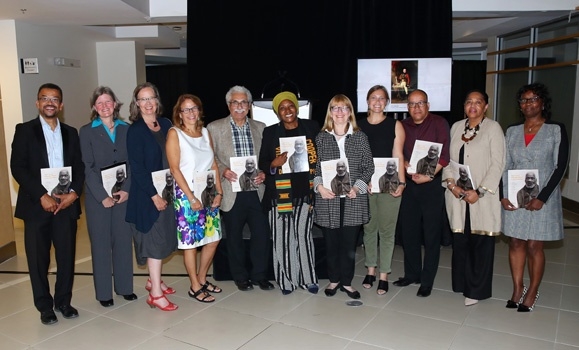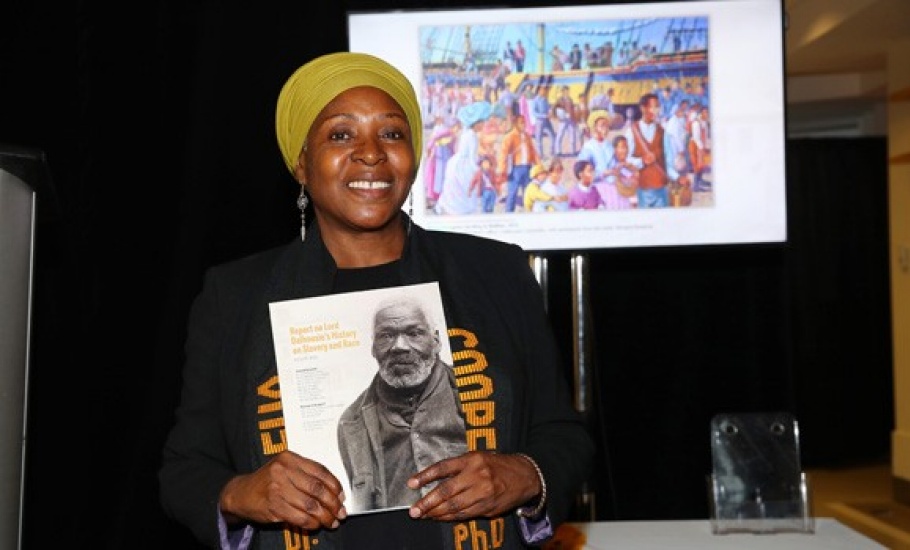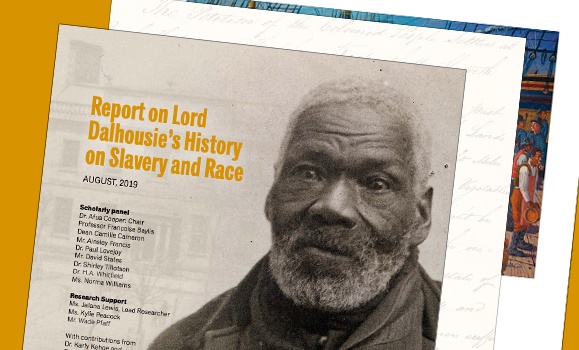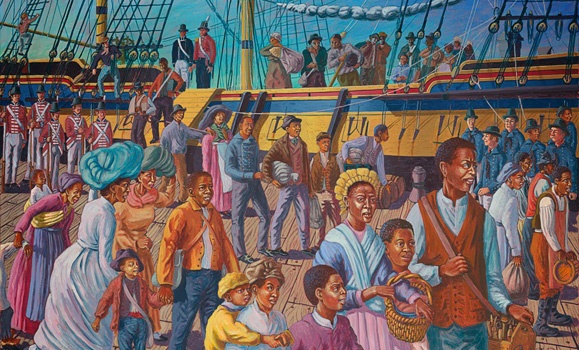Sankofa
Looking back in order to move forward
Over the past 200 years, Dalhousie University has become known around the world for teaching excellence, groundbreaking research, and community engagement. We have forged new frontiers of knowledge and understanding, and through education we have shaped the history of our region and our country for the better. Dalhousie University’s legacy is one that generations of alumni, faculty, staff, and supporters celebrate with pride.
For this proud legacy to enter its third century, we must confront the complicated history of our namesake, George Ramsay, the ninth Earl of Dalhousie. Lord Dalhousie established this university in 1818 while serving as Lieutenant Governor of Nova Scotia, envisioning a university open to all regardless of class or creed. Yet the historical record shows another side of Ramsay: troubling views on Nova Scotia’s Black settlers and slavery, which stand in stark contrast to his progressive views on education.
Discussions of race and racism can be fraught, and when it comes to past transgressions it can be all too tempting to dismiss them, treating bygones as bygones, history as ancient history. But we cannot extricate the wrongs of the past from the issues of the present, and in 2019 no institution — let alone one of higher learning — can sit in silence or denial when it comes to racism and its continuing legacies in our society.
In the Twi language of Ghana, the word Sankofa is derived from the phrases “to return;” “to go;” and “to fetch, seek and take.” It emphasizes the importance of moving forward while reaching back to learn lessons from the past and to get what has been taken or lost through exclusion, oppression, or neglect. It is our place and responsibility as a university, with all the tools of scholarship and discourse available to us, to have this important conversation about our past and commit to action going forward.
Applying our tools of scholarship
It is in that spirit that then-president Dr. Richard Florizone and chair of Senate Dr. Kevin Hewitt commissioned the Scholarly Panel to Examine Lord Dalhousie’s History on Slavery and Race, which was endorsed by the Dalhousie Board of Governors and Senate. Stemming out of discussions with the Black Faculty and Staff Caucus, the Panel was established to examine and help us better understand the complicated and controversial questions surrounding Lord Dalhousie’s historic links to the institution of slavery and racial injustice. The Panel was tasked with gathering the historical facts on Lord Dalhousie’s statements and actions with regards to slavery and race; to interpret those facts in both their historical and modern context; and to recommend actions Dalhousie University could take to respond to this legacy, with the goal of building a stronger, more inclusive university that fully reflects our history, our values, and our aspirations.
What the scholarly panel — chaired by Dr. Afua Cooper — has uncovered over the past three years tells a story that is much larger than one person or one university. It is a window into the history of Halifax, Nova Scotia and indeed the broader Atlantic region. It bears witness to views and practices that should feel profoundly wrong to all of us. But it also places those words and actions in their context, providing us with a deeper understanding of not just George Ramsay, but anti-Black racism more broadly in the early 19th century.
On behalf of Dalhousie University: I want to say thank you to Dr. Cooper, and the members of the panel: Dr. Françoise Baylis, Dean Camille Cameron, Mr. Ainsley Francis, Dr. Paul Lovejoy, Mr. David States, Dr. Shirley Tillotson, Dr. Harvey Amani Whitfield, and Ms. Norma Williams, with assistance from Dr. Isaac Saney and Dr. Karly Kehoe, and researchers Ms. Jalana Lewis, Ms. Kylie Peacock, and Mr. Wade Pfaff. These individuals have contributed their time, their insight, and their energy to this work.
Dalhousie is the first university in Canada to commission an accounting of its early intersections with the legacies of slavery, but it will certainly not be the last. This scholarly panel provides an exemplar for others to draw upon as they join us in reflecting on and reconciling with our shared history. Dr. Cooper and the panel are to be commended for their detail, their scholarship, and their thoughtful reflection on ways for Dalhousie University to address the legacy of our namesake and his intersections with the enslavement of People of African Descent.
Our commitment
Today, on behalf of Dalhousie University, I apologize to the People of African Descent in our community. We regret the actions and views of George Ramsay, the ninth Earl of Dalhousie, and the consequences and impact they have had in our collective history as a university, as a province, and as a region. Further, we acknowledge our dual responsibility to address the legacies of anti-Black racism and slavery, while continuing to stand against anti-Black racism today.
The recommendations from the scholarly panel are important and they, along with our upcoming African Nova Scotian strategy, will be critical in informing our path forward. They will be embedded into our forthcoming strategic plan under the leadership and direction of our new vice-provost of equity and inclusion, Dr. Theresa Rajack-Talley. With her extensive scholarly background in Pan-Africanism and studies of racism, she is ideally suited and fully committed to ensuring the scholarly panel’s recommendations inform and shape our efforts moving forward.
The work ahead will take time, as systemic change does not happen overnight. Nor, though, is it work that is just beginning today. It builds on past efforts and actions, informed by response to calls from our community. Our Transition Year Program, the Indigenous Blacks & Mi’kmaq Initiative in our law school, the James R. Johnston Chair in Black Canadian Studies, and the Imhotep’s Legacy Academy outreach program are all examples of how individuals and groups within our university have worked to live up to our obligations to our African Nova Scotian communities. Aligned with Dalhousie University having proclaimed the UN International Decade for People of African Descent last year, we are now expanding our academic offerings in Black and African Diaspora Studies, increasing the recruitment and retention of Black faculty and staff, developing new supports for students of African descent – including creating a new Sankofa scholarship for the 2020/2021 academic year in recognition of the panel’s efforts – and working to better celebrate and recognize the many contributions People of African Descent have made to our university and our region.
There are many people and groups across our campuses who have worked tirelessly — and continue to work — to support People of African Descent in our community. These include but are not limited to: the Black Faculty and Staff Caucus; the University Strategic Direction priority 5.2 Steering and Advisory Committees, as well as Senator Wanda Thomas Bernard, who has been an ongoing resource to me, and to past presidents.
The path forward
The responsibility for the work to come is shared between the university governing bodies we represent here today; with the staff, faculty, alumni, and students that make up our university community; and with our partners in government, in industry, and in our communities. That said, Dalhousie University should and must take a leadership role in this responsibility. We cannot change the history detailed by this scholarly panel, nor change how it has informed our present — but we do get to decide how it shapes our future.
We affirm, without qualification, that Dalhousie University must be a place where everyone feels valued and respected. Where diversity, equity and inclusion are core values in our mission of teaching and learning, research, and service to our communities. Where we challenge racism and its systemic legacies within our own walls and in our broader community. And where we do the work required to meet our responsibilities to reconcile with our past and build a better future for individuals and communities of African descent and, indeed, all people.
This is what we want the name “Dalhousie” to be known for in our third century and beyond. This is the legacy we will build together.
Dr. Teri Balser, Interim President, Dalhousie University
Dr. Kevin Hewitt, Chair, Dalhousie University Senate
Candace Thomas, Chair, Dalhousie University Board of Governors




